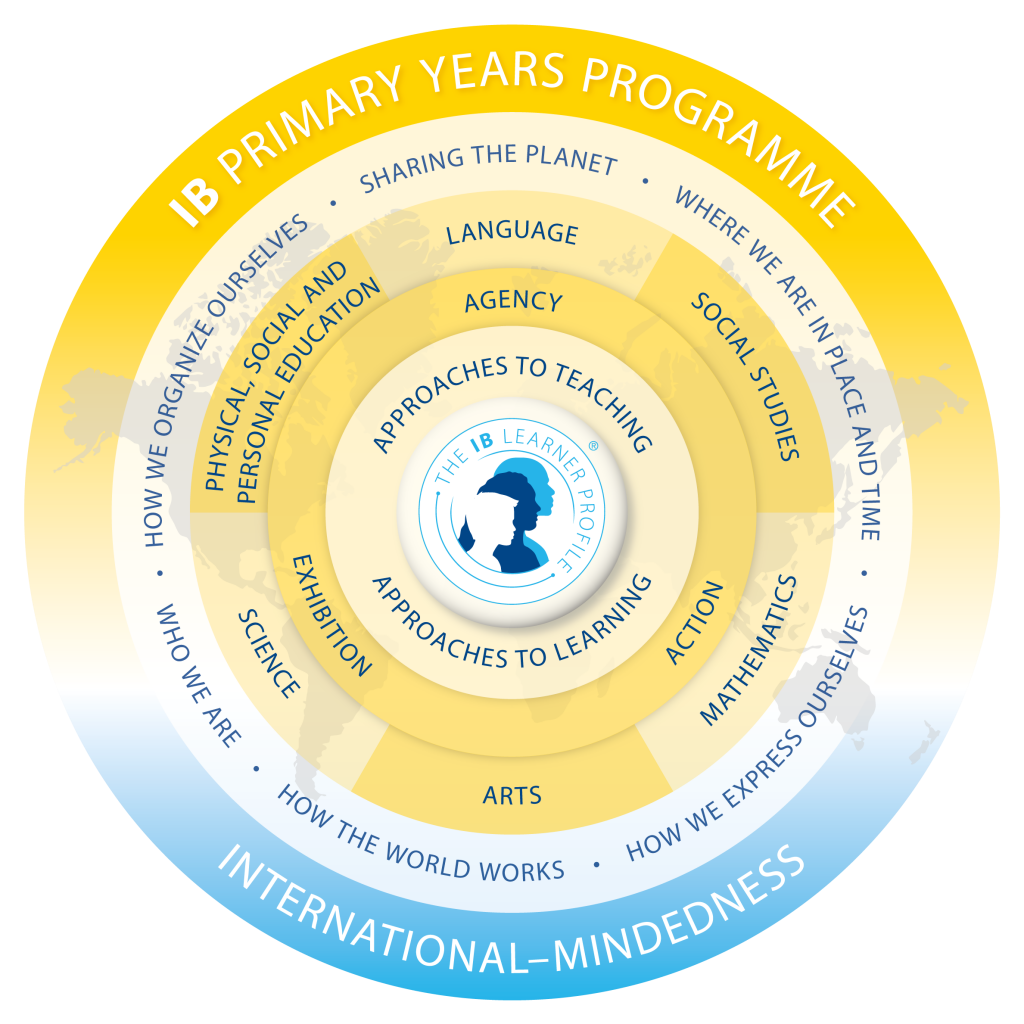
The Primary Years Programme (PYP) is a comprehensive international education curriculum framework designed by the International Baccalaureate® Organization (IB) for kindergarten and primary school children (aged 3-12 years).
The code of values of a PYP school should reflect the IB Mission Statement for the creation of a better and more peaceful world, through teaching approaches designed and implemented according to IB standards and practices.
The PYP is currently offered in both national and international schools in over 150 countries worldwide. By providing a general framework for learning, the PYP enables schools to align the objectives of their national curricula with the educational philosophy of IB programmes. Thus, schools are able to adopt common principles on the one hand, while maintaining their unique identity on the other.
The PYP is not meant to replace the respective national educational systems. Rather, it reshapes the teaching strategies and methodology, and the way knowledge and understanding are fostered by students. Hence, children are able to deepen their knowledge by participating actively and experientially in lessons while also developing their critical thinking skills.
Holistic Experience
The PYP actively contributes to a holistic educational experience. Through inquiry and discovery, students, teachers and the school community collaborate in order to connect and apply prior knowledge to new situations, deepen existing knowledge, broaden perceptions, and improve the way they understand the social and natural world.
Based on the premise that children are innately curious and creative with the ability to think critically and reflect, the PYP provides a dynamic learning environment, full of opportunities for reflection, inquiry and discovery, linking knowledge with life experiences and connecting it to the surrounding world.
Using prior knowledge and recognizing each child’s unique characteristics, the PYP contributes to the holistic development of his/her individual personality.
For this reason, the essence of all International Baccalaureate® (IB) Programmes centers on the Learner Profile, which is comprised of ten attributes aimed at embracing a lifelong love of learning and the well-rounded development of the student through the reinforcement of certain skills (Approaches to Learning Skills). More specifically, children are invited to gradually develop a range of social skills, communication skills, thinking skills, research skills, and self-management skills.
Students at a PYP school discover intrinsic motives for learning and are constantly encouraged to expand and enrich their knowledge, to gradually develop the aforementioned skills, and to adopt responsible life attitudes, all of which reflect the increasing demands of the 21st century. To be able to approach knowledge and understanding in an exploratory and interdisciplinary way, to hone skills, to develop attitudes, and to raise awareness as global citizens.
Students are involved in actions which not only help them realize and exploit their potential, but also make them feel the need to put into practice what they have learned. Moreover, students have the opportunity to make choices, to have their own voice heard, and to gradually take ownership of the learning process.
Thus, the pedagogical process targets and fulfills both the academic and social-emotional needs of students. Additionally, the benefits of this balanced learning practice ensure a seamless transition to secondary education.
Ultimately, the goal is for students, as critical thinkers and sensitized citizens, to take ownership (agency) and act on their own initiative (action) for the benefit of society so that they may successfully live up to the demands of an internationally-minded environment both now and in the future.
PYP Curriculum Framework
The PYP, like all IB programmes, is based on transdisciplinary education and inquiry, which means that students explore important concepts across all subject areas.
Through a transdisciplinary approach to the curriculum, the PYP encourages students to discover themselves and their particular skills. It also encourages them to perceive and understand the world around them based on their prior knowledge and their personal interests.
This goal is achieved through the Programme of Inquiry (PoI) surrounding six Transdisciplinary Themes listed below. These themes are the lens through which students approach knowledge.
- Who We Are
- Where We Are in Place and Time
- How We Express Ourselves
- How the World Works
- How We Organize Ourselves
- Sharing the Planet
Teachers restructure the national curriculum by incorporating the syllabus in these transdisciplinary themes in order to make learning relevant to the real world. Through these transdisciplinary themes, students effectively participate in the learning process, work collaboratively, propose and develop ideas, assimilate knowledge empirically, and learn to evaluate situations using critical thinking and self-assessment.
The transdisciplinary themes organize the body of knowledge into six (6) Transdisciplinary Units of Inquiry per grade level. The design of units that students inquire into is based on age-appropriate needs, their personal interests, and fulfillment of syllabus requirements as defined by the National Curriculum.
Collaborative planning involves all teachers of the same grade level, and the study of each unit takes anywhere from four to six weeks.
At each grade level, different modules are selected for implementation based on the planning of each section. The Transdisciplinary Units of Inquiry are incorporated into all subject areas: Greek and English Language, Mathematics, Natural and Social Sciences, Arts (Theater, Play, Music), Personal and Social Development/Physical Education.
Each Unit of Inquiry is based on the concept-based learning approach, which is as follows:
- Central idea
- Key concepts
- Related concepts
- Lines of inquiry
Through the above, students are suitably guided to organize knowledge in their own unique way, to discover patterns, common principles and processes, and to reflect on what they already know and connect it to unfamiliar contexts. As a result, they are better able to understand and process the constantly evolving information of the modern world.
Students develop and share ideas, explore and connect knowledge with real life, and develop skills that put them at the heart of the learning process. Their role is active and catalytic, thus transforming them into protagonists in the learning journey.
